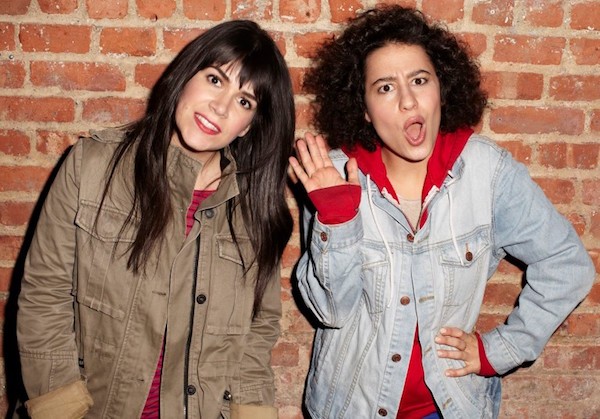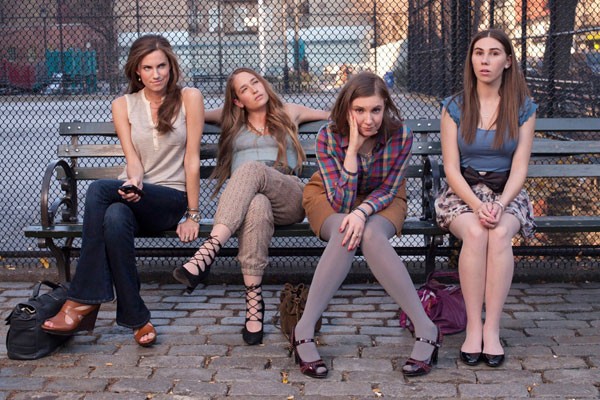
Abbi Jacobson and Illana Glazer of Broad City
It is unfair that Broad City and Girls are so often mentioned in the same breath because the two shows’ differences are many, while their similarities are surface-level. Both are half-hour comedies about white, female friends in their mid-twenties as they navigate sex, jobs and friendship in New York City. Both are written, directed and acted by their female creators. And both are saddled, time and again, with defining Who Young Women Are for the dry sponge of baby-boomer-run media. With both series debuting new seasons this month (Girls on its 5th and Broad City on its 3rd), we should ready ourselves yet again for an endless puddling of comparative lit devoted to the shows, in the mediocre company of which we can count this blog.
Despite their skin-deep similarities, Broad City and Girls are different species. It’s easy to love Broad City and hate Girls. It’s fun to watch Broad City while, at times, it almost physically hurts to watch the self-defeating character machinations of the women and men on Girls. And while Lena Dunham’s sea-change of an HBO show tends to garner criticism for its white, middle class myopia, Broad City gets a critical pass, even a critical hi-five.
Broad City, a Comedy Central production, takes the classic plot approach pitting its odd couple leads against an episode-defining event. One of the show’s inaugural episodes follows Abbi Jacobson and Ilana Glazer as they try to raise money to go to a Lil Wayne concert, navigating everything from Craigslist to the Q Train to make it happen. In its newest episode, Abbi and Ilana struggle to make it to a former roommate’s art opening, encountering rabid warehouse sales, a circus school graduation, and a moving porta potty along the way. The structure is predictable but the take is fresh — the show’s humor is expertly patched together from whatever was on Twitter last week and the fucked up story your friend from college told you about her crush. In this new episode as in the past two seasons, they pull it off.
Formally, Broad City is the “Frogger” episode of Seinfeld taken to its logical conclusion. Nothing ever happens. It doesn’t matter if George Costanza gets Frogger across the street or not. It doesn’t matter if circus school is in session. It is less about the characters, lovable as they are, than it is about the weird fabric of New York City. This bodes well for the series longevity, so long as the writing stays good.
But the by-the-book approach of Broad City also somewhat limits what I cringe at calling the “radical potential” of a show like Broad City, because, at the end of the day, this is a complex portrait of being young and loving weed and hating your job in New York City, but it’s a simple draft of what female friendship looks like.

Allison Williams, Jemina Kirke, Lena Dunham, and Zosia Mamet of Girls
Girls— frequently intolerable, unkind to its characters, caricatural, too white, set in New York City but never on the subway (this really annoys me) — nonetheless stakes a more difficult claim. It still seeks, and has always sought, to expand the category of what kinds of female relationships, bodies and emotions can be shown on mainstream television. In its 5th season, we meet Marnie (Allison Williams) on her wedding day, neurotically over-directing her doomed nuptials with chronically selfish boyfriend, Desi (Ebon Moss-Bachrach.) (If you don’t want spoilers, stop reading here.) Hannah is on hand, acting surly: “She has been so inappropriate and unsupportive of me all day,” Marnie complains to Shoshanna (Zosia Mamet), while Jessa (Jemima Kirke) flirts with danger in the form of Hannah’s ex, Adam (Adam Driver). The episode switches lithely between the women’s wedding preparations and the men’s. The writing is good: “This conversation sounds like a fucking E. E. Cummings poem,” rails the series current hero, Ray, when Adam and Hannah’s new boyfriend engage in a long-form, male emotion-grunting session.
As far as episodes go, the newest is far from the most challenging. Girls cut its teeth on crack, nudity, awkward sex, alcoholism, BDSM and (perhaps most offensive) painfully unlikeable characters. None of that here. The biggest success of the first episode of the 5th season of Girls is that we have the same characters, improbably intact, that we started out with years ago. They have changed the way real people change — subtly. They have not been good friends to each other, but they have not been entirely bad friends to each other. Instead, the quartet of women proves something that is very true but too rarely portrayed, which is that sometimes your best friends are not the people you most like, but the ones you end up with. And that is okay.
Yes: With the start of these new seasons, I still feel some aversion to watching Girls and I like watching Broad City. Both are good shows. Neither offers a good five point summary of what is means to Be Female and In Your Twenties Today (take note, think-piece editors of the world.) They aren’t really even comparable, except that when both premiere new episodes next week, I have to say — despite how much fun Broad City is, I’ll probably watch Girls first.